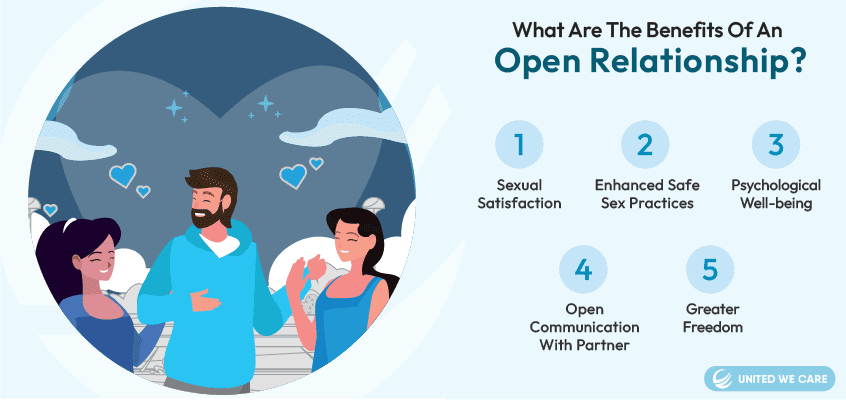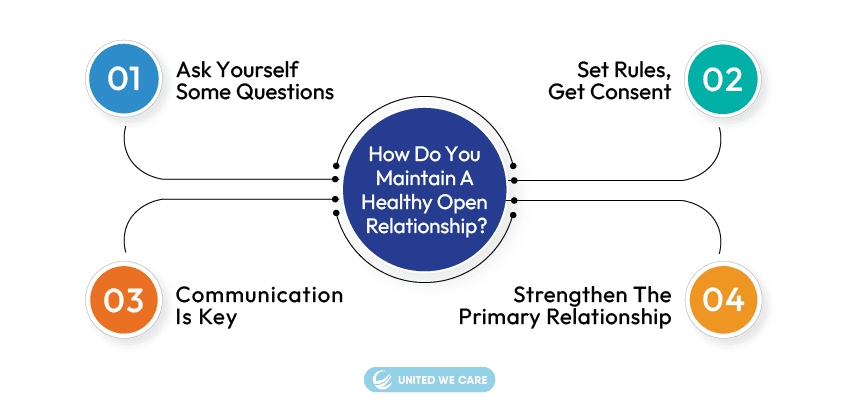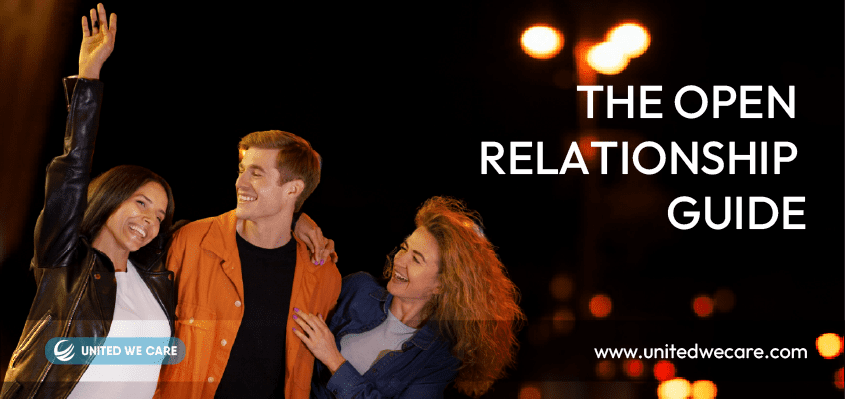Introduction
Relationships are complex and different in experience for everyone. Yet, society has not shied away from determining the “best practices” of relationships. However, people today are breaking away from norms and engaging in relationships that make them feel fulfilled. Open relationships, or relationships where partners can engage in sexual or emotional intimacy with people other than each other, are one such example. However, these relationships can be difficult to manage and often come with their unique set of challenges. In this article, we will help you understand the nuances of open relationships and guide you on how to maintain healthy open relationships.
What is an Open Relationship?
“The experiences that the freedoms that we’ve given one another and the unconditional support, to me, is the highest definition of love.” – Actor Will Smith on his Open Marriage [1]
To begin with a definition, open relationships refer to a type of relationship where all partners are in explicit agreement that they can have sexually and, at times, emotionally intimate relationships with other people [2]. Interest in open relationships is on the rise. One Canadian survey found that 12% of the participants indicated open relationships as the ideal form of relationships [3]. In another survey done in the US, 20% of millennial participants and 10% of Genz participants expressed their interest in being in such a relationship [4].
Open relationships come under a broad category of consensual non-monogamous (CNM) relationships or CNM relationships. People involved in CNMs tend to use different terms to identify themselves [3]. For instance, the term swinging is common for married couples who have sex with other individuals or exchange sexual partners for recreational purposes. While swinging is purely sexual, polyamory is CNM, where all individuals explicitly agree to be emotionally and sexually involved with each other (ex: throuple, quad, etc.) [5]. Other terms like V relationships, mono-poly relationships, and solo-poly relationships are also used in the realm of open relationships depending on the agreement reached between the partners [6].
What are the Benefits of an Open Relationship?
Some authors have termed CNM as an alternative to infidelity. For instance, Mogilski and his colleagues discuss that in humans (both males and females), there exists contrasting motivations to have multiple partners while at the same time committing to one partner. In such situations, open relationships become a means of balancing these opposite forces [7].
Researchers have conducted numerous studies on the outcomes and experiences of open relationships, and many of them are beneficial. Some of these benefits include [2] [5] [7]:

- Sexual Satisfaction: One biggest benefits of open relationships is increased sexual satisfaction. Engaging in sex beyond the dyad can bring a sense of adventure and excitement.
- Enhanced Safe Sex Practices: Individuals in open relationships are more likely to indulge in safe sex practices such as the use of condoms and regular check-ups for STDs.
- Psychological Well-being: People have also reported feeling more positive, less bored, happy, and excited about life after changing their relationship status to open.
- Open Communication with Partner: There is more honesty in CNM relationships as partners are able to communicate with each other clearly and without fear of judgment around one’s desires. There is also an absence of pressure to fulfill a person’s needs all by yourself. This pressure-less and safe space for communication brings you and your partner closer in terms of emotional intimacy and trust.
- Greater Freedom: Open relationships allow the exploration of new interests, experiences, and versions of yourself without judgment from the person you love.
Read more about Fight The Stereotype and Promote Open Mental Health Conversations At Work
What are the Challenges of an Open Relationship?
Despite the benefits, open relationships come with a unique set of challenges. Some of the challenges include [2] [5] [7]:
- Jealousy: Jealousy and insecurity are common when people are in such relationships. At times, it may be strong enough to overpower every other benefit of being in an open relationship and significantly reduce relationship satisfaction.
- Increased Risk of STIs or Pregnancy: Multiple partner sex increases the risk of STIs and unplanned pregnancy. This becomes especially problematic if the source is a secondary partner you both knew briefly (for instance, they were a one-night stand).
- Social Stigma: Traditionally, societies consider monogamy as the gold standard of relationships. In some studies, 26-43% of people in open relationships have reported feeling this social stigma and discrimination.
- Crossing of Boundaries: There is an inherent risk that one of the partners may break the rules or cross the boundaries or feel the need to hide something. In such situations, this process can become uncomfortable and toxic for all individuals involved.
- Fear and Other Negative Emotions: Human beings are complex animals with complex emotional capacities. When partners engage in sex with others, insecurity, pain, and fear, such as fear of being left by the partner, might increase.
How do you Maintain a Healthy, Open Relationship?
If you are interested in open relationships and are planning to navigate them, know that maintaining healthy open relationships is possible but requires time, effort, and tolerance of discomfort from both partners. Some effective strategies to maintain an open relationship are [5] [8]:

- Ask yourself some questions: Before trying anything out reflect on whether it is actually something you wish to pursue. Reflecting on your reasons, motivations, the strength of your current relationship, and your ability to handle complex emotions is important before making this decision.
- Set Rules, Get Consent: Once you have decided that this is something you wish to explore, you and your partner need to communicate with each other and consent to the process. If there are any doubts, both of you need to sit and solve them together. Other explicit rules and boundaries also need to be set, which determine how and when you both will engage in sex with others and whether or not emotional intimacy is allowed.
- Communication is Key: As you both navigate an open relationship, jealousy or other emotions may arise. You need to set up a process for communication of these emotions and other challenges with each other.
- Strengthen the Primary Relationship: It is also important to nourish and strengthen the primary relationship. You can discuss things like “date time” with each other or some special things that only you two will continue.
Conclusion
Open relationships can become a fulfilling experience for any couple. However, open relationships come with their unique set of challenges. Not only are they socially looked down upon, but they are also prone to jealousy, increased risk of STIs and risk of boundaries being broken. Yet it is possible to maintain a healthy, open relationship if you and your partner are able to communicate openly, answer important questions honestly, and set rules for yourself. If you wish to try open relationships and are struggling to manage their dynamics, you can contact our experts at United We Care. Our mental health website has a range of professionals who are committed to providing you with the best solutions for your well-being.
References
[1] “11 polyamorous celebrities who’ve opened up about non-monogamy,” Cosmopolitan, https://www.cosmopolitan.com/uk/love-sex/relationships/g39137546/polyamorous-celebrities/ (accessed Jul. 23, 2023).
[2] A. N. Rubel and A. F. Bogaert, “Consensual nonmonogamy: Psychological well-being and relationship quality correlates,” The Journal of Sex Research, vol. 52, no. 9, pp. 961–982, 2014. doi:10.1080/00224499.2014.942722
[3] N. Fairbrother, T. A. Hart, and M. Fairbrother, “Open relationship prevalence, characteristics, and correlates in a nationally representative sample of Canadian adults,” The Journal of Sex Research, vol. 56, no. 6, pp. 695–704, 2019. doi:10.1080/00224499.2019.1580667
[4] Daily questions | 2021 | 04 April | 4/12 – how interested would you be …, https://docs.cdn.yougov.com/i706j1bc01/open-relationships-generation-sexuality-poll.pdf (accessed Jul. 23, 2023).
[5] A. B. Fournier, “What is an open relationship?,” Verywell Mind, https://www.verywellmind.com/what-is-an-open-relationship-4177930 (accessed Jul. 23, 2023).
[6] “Types of polyamorous relationships: 8 great ones to know,” The Relationship Place, https://www.sdrelationshipplace.com/types-of-polyamorous-relationships/ (accessed Jul. 23, 2023).
[7] J. Mogilski, D. L. Rodrigues, J. J. Lehmiller, and R. N. Balzarini, Maintaining multi-partner relationships: Evolution, sexual ethics, and consensual non-monogamy, 2021. doi:10.31234/osf.io/k4r9e
[8] A. Shrikant, “3 rules for a successful open relationship, from a therapist: ‘more communication is nearly always better than less,’” CNBC, https://www.cnbc.com/2022/09/24/three-rules-for-a-successful-open-relationship.html (accessed Jul. 23, 2023).










